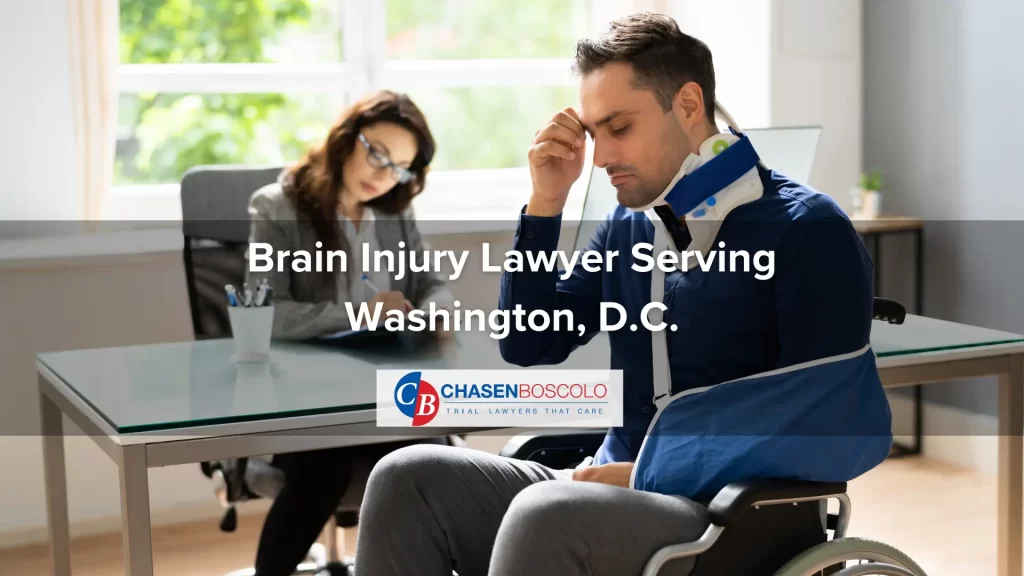
The severity of any injury to a person’s brain cannot be overstated because the brain is the command center of the central nervous system. Needless to say, even a minor brain injury can have damaging effects on a person’s basic ability to function.
Brain injuries can be caused by a variety of accidents in which a person strikes their head. When the accident that caused the brain injury was the result of another party’s negligence, the victim may be able to recover compensation for medical bills, lost wages, and other damages from the responsible party.
If you or your loved one suffered a brain injury in an accident caused by another party’s negligence in the greater Washington, D.C. area, you deserve justice. CHASENBOSCOLO understands the many challenges brain injury victims and their families face. We work hard to help these people get all the assistance they need and deserve. Our firm has recovered more than $750 million for our clients. Call (301) 220-0050 or contact us online to schedule a free, no-obligation consultation.
Do I Need A Brain Injury Lawyer?
Some victims are tempted to believe that insurance companies will fully compensate them because of the severity of their injuries. Many of these victims will be astonished to learn just how quickly the insurers will downplay the nature of the injuries.
In many cases, insurance companies will place rigorous demands on victims for extensive medical documentation covering all of their treatment and providing specific information about the brain injury. In some cases, a person may be asked to submit to an independent medical examination (IME).
You should not agree to any independent exam until you have an attorney. A lawyer can ensure that you do not answer any unnecessary questions you may be asked during an IME. These exams are often used by the insurance company’s selected doctors to glean any information from victims that may be damaging to their personal injury claims.
Insurance companies may offer you a lump sum settlement to resolve your case. Know that whatever you are being offered is likely far short of what you are actually entitled to. A lawyer can evaluate any settlement offers made to determine whether they are sufficient, and negotiate with insurance until you get the compensation you deserve.
Why Choose CHASENBOSCOLO To Handle My Case?
 CHASENBOSCOLO has made taking care of the client our top priority since our firm’s founding in 1986. More than 30 years later, we now have a team of 25 lawyers and more than 90 professionals with over 100 years of combined legal experience. We are available 24 hours a day, seven days a week, so your phone call is always answered. CHASENBOSCOLO also provides the No Fee Guarantee®, which means that you only pay when you receive a monetary award.
CHASENBOSCOLO has made taking care of the client our top priority since our firm’s founding in 1986. More than 30 years later, we now have a team of 25 lawyers and more than 90 professionals with over 100 years of combined legal experience. We are available 24 hours a day, seven days a week, so your phone call is always answered. CHASENBOSCOLO also provides the No Fee Guarantee®, which means that you only pay when you receive a monetary award.
Barry M. Chasen and Benjamin T. Boscolo have each received an AV Preeminent rating from Martindale-Hubbell, denoting the highest level of professional excellence. Mr. Chasen is a member of the District of Columbia Bar, Prince George’s County Bar Association, and Association of Trial Lawyers of America, while Mr. Boscolo has been a workers’ compensation panelist for both the National Football Players Association and Major League Soccer Players Association.
CHASENBOSCOLO will negotiate for a fair and full settlement for your case. When an insurance company does not extend a satisfactory offer, we will not hesitate to file a lawsuit to try your case in court.
Types of Brain Injury Cases We Handle
A traumatic brain injury (TBI) does not always involve immediate symptoms as they can be more subtle. Physical symptoms may include:
- Blurred vision
- Migraine headaches
- Loss of coordination
- Repeated vomiting or nausea
- Loss of consciousness
- Seizures
- Dizziness
- Fluids draining from the nose or ears
- Weakness or numbness in fingers and toes
- Convulsions
The mental and cognitive symptoms may include:
- Irritability
- Short-term memory loss
- Amnesia
- Changes in appetite
- Disorientation
- Depression
- Agitation
- Profound confusion
- Slurred speech
The most common kind of TBI is a concussion, which accounts for thousands of emergency room visits each year. Concussions are typically caused by a sudden forceful blow to the head that shakes the brain. Other types of TBI include:
- Contusion – bruising of the brain tissue
- Coup-contrecoup lesion – contusions on both sides of the brain
- Penetrating injury – when external objects enter the brain
- Diffuse axonal injury – tearing of the brain’s connecting nerve fibers
Possible accidents causing TBIs include:
- Car Accidents
- Workplace Accidents
- Truck Accidents
- Slip and Fall Accidents
- Motorcycle Accidents
- Nursing Home Abuse
- Bicycle Accidents
- Defective Products
- Pedestrian Accidents
- Construction Accidents
- Violent Crimes
Brain injuries unfortunately frequently result in death. If your loved one has passed away as a result of a brain injury sustained in one of the above-listed incidents, you may be able to file a wrongful death claim against the at-fault party to recover compensation for funeral expenses, lost income, and more.
Frequently Asked Questions (FAQs) About Brain Injuries
Brain injury claims are complex. If you are considering a lawsuit, we have posted the answers to some of the most common questions we hear below. You can also contact us at (301) 220-0050 for answers to any specific questions you may have.
What is the difference between an acquired brain injury and a traumatic brain injury?
A TBI refers to a brain injury that is caused by some sort of external impact to a person’s skull, whether it is the head bumping into something or something striking the head. An acquired brain injury is a brain injury that occurs after birth but is not genetic or caused by birth trauma. Strokes, near drownings, heart attacks, tumors, or other medical conditions are some of the most common causes of acquired brain injuries. TBIs, on the other hand, are commonly caused by motor vehicle accidents, falls, and other violent collisions. At CHASENBOSCOLO, we can handle claims involving both acquired and traumatic brain injuries.
What is the Glasgow Coma Scale?
Graham Teasdale and Bryan Jennett described the Glasgow Coma Scale (GCS) in 1974 as “a way to communicate about the level of consciousness of patients with an acute brain injury.” The 15-point neurological scale aims to provide a reliable recording of a person’s consciousness as related to eye opening, verbal response, and motor response.
Responses to eye opening are given four grades: spontaneous, to sound, to pressure, and none. Responses to verbal have five grades: orientated, confused, words, sounds, and none. Responses to motor have six grades: obey commands, localizing, normal flexion, abnormal flexion, extension, and none.
The GCS is scored between 3 and 15, with 3 having the worst prognosis, and 15 the best. Those with scores of 8 or greater have a good chance of recovery, whereas scores of 3-5 are potentially fatal.
What are Post-Concussion Syndrome and Second Impact Syndrome?
Post-Concussion Syndrome (PCS) is any prolonged persistence of concussion symptoms in which a person is still experiencing symptoms one or two months after the concussion occurred. Second impact syndrome (SIS) is when a person experiences a second concussion after returning to an activity too soon after suffering their original concussion.
Brain Injury Statistics
According to the American Association of Neurological Surgeons (AANS), approximately 1.7 million TBI cases occur in the United States annually. An estimated 5.3 million people in the U.S. are living with a disability caused by a TBI.
In 2013, the Centers for Disease Control and Prevention (CDC) reported that approximately 2.8 million TBI-related ER visits, hospitalizations, and deaths occurred in the United States. TBI contributed to 50,000 deaths, 282,000 hospitalizations, and 2.5 million people treated and released from emergency departments. The CDC says 153 people in the U.S. die from injuries that include TBI every day.
According to the CDC, rates of TBI-related emergency department visits increased by 47% between 2007 and 2013. An estimated 329,290 children were treated in U.S. emergency departments in 2012 for sports and recreation-related injuries that included a diagnosis of TBI. From 2001 to 2012, the rate of ER visits among children for sports and recreation-related injuries with a diagnosis of TBI more than doubled.
The CDC reported that falls were the leading cause of TBIs in 2013 (47%), followed by being struck by or against an object (15%), then motor vehicle accidents (14%). Falls were the leading cause of TBI death for persons 65 years of age or older, intentional self-harm was the leading cause of TBI death for persons 25-64 years of age, motor vehicle accidents were the leading cause of TBI death for persons 5-24 years of age, and assaults were the leading cause of TBI death for children 0-4 years of age.
The D.C. Department of Health reported that Washington, D.C. had the sixth-highest fatality rate for TBI patients in the nation in November 2018. Eleven organizations or agencies participating in a D.C. Department of Health study reported providing services to an estimated total of 650-1200 TBI survivors and/or their families, providing at least one service during the previous 12 months.
Contact a Brain Injury Attorney in Washington, D.C.
Did you or your loved one sustain a brain injury in an accident caused by another party’s negligence in Washington, D.C.? You should know that you do not have to suffer because of your injury and you could be entitled to compensation for all of the damages your injury has caused.
CHASENBOSCOLO went to court for its clients more than 500 times in a span of five years. We can explore all of your legal options as soon as you call (301) 220-0050 or contact us online to receive a free consultation.





